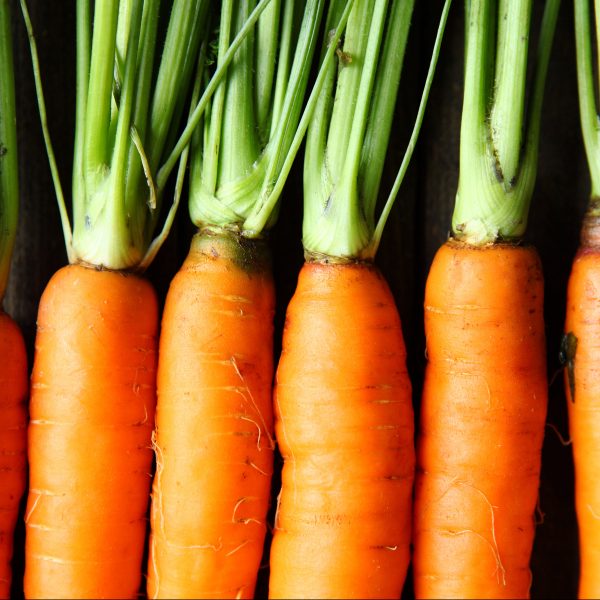Fall is a time of year when farmer’s markets abound with gourds, squash, pumpkins and root vegetables like carrots. Carrots are a rich source of beta carotene that the liver converts to vitamin A, an important nutrient for fertility and pregnancy health.
The Latin name of the carrot, Daucus carota, can be traced back to the 3rd century BCE ancient Roman writings. Carrots originated in the Middle East and Asia, and in pre-Hellenic times, yellow carrots grew in Afghanistan. Carrots were used by Greeks and Romans as medicine, but didn’t become popular in Europe until the Renaissance. European colonists introduced the carrot to North America where it was the first vegetable to be canned (in the 1800s).
We consider the carrot to be a fertility superfood. While the ancient civilizations and modern-day Europeans may not have known this, researchers at Harvard University’s School of Public Health found that orange and yellow vegetables (they focused on carrots, spinach and lettuce) boost sperm health, including motility due to the antioxidant beta carotene that they contain. In the study, beta-carotene was found to improve sperm motility by 6.5% to 8%.
Other Fun Carrot Facts:
- A single carrot more than fulfills the recommended daily Vitamin A requirement.
- Carrots are excellent sources of vitamins A, K, C, and B6, biotin, fiber, potassium and thiamine.
- Carrots are rich in antioxidants known to protect heart and eye health, and studies have evaluated the effectiveness of carrots at reducing the rates of bladder, cervical, prostate, colon, larynx, and esophageal cancers.
- There are more than 100 different varieties of carrots and while most often associated with the color orange, carrots can also be red, purple, yellow, white, and even black.
Eating & Cooking Carrots
Choose carrots that are hard, smooth, crisp, deep orange in color and fresh, without cracks in them. Carrots can be eaten raw or cooked. In fact, cooking them is said to enhance the bioavailability of beta-carotene. Add them to fresh squeezed juices, homemade soups, stews and sauces, and baked goods or puree them in your fertility smoothies. Avoid those prepackaged baby carrots; rumor has it that they are bathed in chemicals to make them stay moist and a vibrant orange longer.
Fall Fertility Side Dish – Cumin Candied Carrots!
This carrot side dish is savory and sweet, and would complement any poultry meal. It makes me think of Thanksgiving.
Ingredients:
- 1-2 lbs. small to medium carrots (I grew mine so left the skins on…) washed, peeled and greens cut off
- 2 Tbsp. Extra Virgin Olive Oil
- ¼ tsp each sea salt and fresh cracked black pepper
- a pinch of hot pepper flakes or cayenne (optional)
Glaze (the “candied” part)
- 4 Tbsp. melted grass-fed butter, allowed to cool below 100 degrees Fahrenheit
- 1 Tbsp Raw Honey
- 1 tsp ground cumin
To make:
- Preheat oven to 350 degrees Fahrenheit.
- Combine first four ingredients and toss in an oven safe pan. Roast for 30-45 minutes until fork tender. Remove from heat and allow to cool.
- Combine Glaze ingredients in a glass bowl and whisk.
- When carrots have cooled enough to eat, toss them in the glaze and serve warm.
Are you worried about consuming too much vitamin A?
According to the Linus Pauling Institute at Oregon State University, “… vitamin A toxicity is called hypervitaminosis A. It is caused by overconsumption of preformed vitamin A [from animal products], not carotenoids [from fruits and vegetables]… Generally, signs of toxicity are associated with long-term consumption of vitamin A in excess of 10 times the RDA of 25,000-33,000 IU/day…” We are often asked, Is Vitamin A Dangerous for My Pregnancy and Baby? Studies haven’t proven any danger when vitamin A is consumed in a whole food diet rich in vegetables and fruits, lean meats and cold-water fish, along with a whole food preconception or prenatal multivitamin that also contains vitamin A.
- Barton-Schuster, D. (n.d.). 5 Fertility Superfoods You Should Know About. Retrieved from: http://natural-fertility-info.com/5-fertility-superfoods.html
- Micronutrient Information Center. (n.d.). Retrieved from: http://lpi.oregonstate.edu/mic/vitamins/vitamin-A
- Murray, M., & Pizzorno, J. (2005). The Healing Power of Vegetables. In The encyclopedia of healing foods (pp. 179-181). New York: Atria Books.
- Taylor, V. (2013, November 1). Carrots boost male fertility: Study. Retrieved from: http://www.nydailynews.com/life-style/health/carrots-boost-male-fertility-study-article-1.1504019





